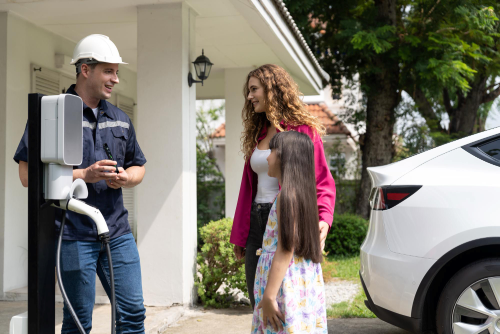The rise of electric vehicles (EVs) has increased demand for electric vehicle charger installation in Bergen County NJ. As more residents switch to eco-friendly transportation, having a reliable home charging solution becomes essential. Installing an EV charger provides convenience but also increases your property value. However, the process involves more than just plugging in a device; it requires careful planning and professional expertise. Proper installation ensures safety, efficiency, and compliance with local regulations. Understanding the basics of EV charger installation can help homeowners make informed decisions and prepare for this important home upgrade.
Types of EV Chargers
There are primarily two types of EV chargers suitable for home installation: Level 1 and Level 2. Level 1 chargers use a standard 120-volt household outlet and are the slowest option, typically adding about 3-5 miles of range per hour of charging. Level 2 chargers, on the other hand, require a 240-volt outlet and can add 25-30 miles of range per hour. The choice between these depends on your vehicle’s battery capacity, daily driving needs, and the time you have available for charging.
Assessing Your Home’s Electrical System
Before proceeding with electric vehicle charger installation in Bergen County NJ, it’s crucial to assess your home’s electrical system. This involves evaluating your current electrical panel capacity and determining if upgrades are necessary. Many older homes may require electrical service upgrades in Bergen County NJ to accommodate the additional load of an EV charger. A professional electrician can perform a thorough assessment and recommend the necessary modifications.
Choosing the Right Location
Selecting the optimal location for your EV charger is vital for convenience and efficiency. Ideally, the charger should be installed close to where you park your vehicle, typically in a garage or carport. Consider factors such as cable length, protection from the elements, and ease of access. The installation should also comply with local building codes and regulations to avoid any electrical code violation correction in Bergen County NJ down the line.
Professional installation ensures that all work is done safely and in compliance with local electrical codes. It also helps prevent potential electrical code violation correction in Bergen County NJ that could arise from improper installation.
Electrical Service Upgrades
In many cases, installing an EV charger requires electrical service upgrades in Bergen County NJ. This might involve upgrading your electrical panel to accommodate the additional load or installing a completely new service panel. These upgrades support your EV charger and improve your home’s overall electrical capacity, allowing for future electrical additions or improvements.
Cost Considerations
The cost of electric vehicle charger installation in Bergen County NJ varies widely depending on factors such as the type of charger, the complexity of the installation, and any necessary electrical upgrades. While the initial investment may seem significant, it’s important to consider the long-term savings on fuel costs and the added value to your property. Some utility companies and government programs also offer incentives or rebates for EV charger installations, which can help offset the costs.
Do you Need a Great Electrician who can handle top-notch Residential jobs in all the highrises in the Bergen County? Call Johan Now and Save! Click HERE
Johan, On Call Electrical Contractor, Electrical Services Company has been in the business since 2022 in the NJ Area.
Proudly Servicing Union City, West New York NJ, North Bergen, NJ, Jersey City NJ, Fairview NJ, Bergenfield, Englewood NJ, Dumont, Hackensack NJ, Garfield, Clifton NJ, Keyport NJ, Redbank NJ, freehold NJ, Neptune NJ, Plainfield NJ, New Brunswick, Perth Amboy, Carteret, Middlesex, Woodbridge, South River, North Brunswick
In the counties of Hudson, Bergen, Essex, Passaic, and Hoboken New Jersey
